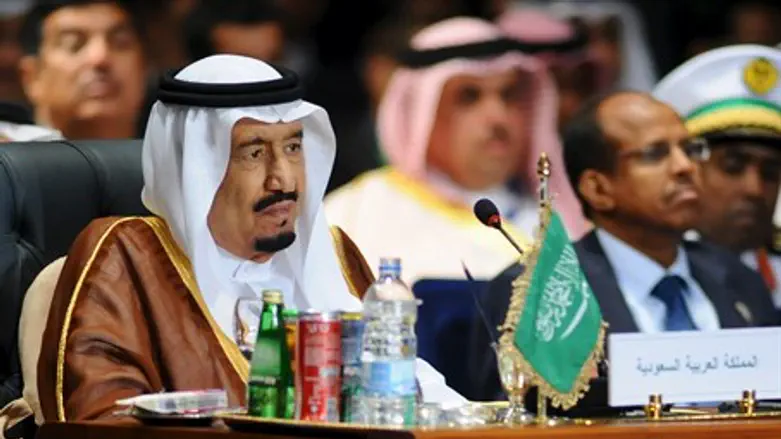
The Arab League has never been known for the unity that other international alliances have projected. NATO was a strong, American-led alliance throughout the Cold War (and in many ways still today); the European Union, for all its diversity, has a unified foreign policy.
The Arab League on the other hand has been plagued by its members changing heads of state every few years or so in bloody revolutions. The League has split along different fault lines at several points in its history, and is now challenged by an inter-Arab conflict between pan-nationalists and pan-Islamists.
Make no mistake, Saudi Arabia bucks this trend.
Saudi Arabia is definitely responsible for much of the religious fanaticism in the modern Arab World (and made some definite financial contributions to teaching extremist Islam in Pakistan and Afghanistan). But today, Saudi Arabia is a fierce critic of the Muslim Brotherhood and despises ISIS. If not for Iran, it is difficult to gauge how much more aggressive the Saudis might be toward these groups. The Saudis have become the main financial backers for the economically troubled post-revolutionary Egypt.
The Saudis have combined their financial power with a status as the largest weapons importer in the world (recently passing India). After decades of stockpiling its modern arsenal, the Saudis are putting their power to the test in the invasion of Yemen. Operation Decisive Storm is not the first Saudi op in the last few years, but it has the most international legitimacy. It leads a coalition of at least 10 (possibly more) states in a fight against a Zaydi Shiite rebel group, the Houthis. While it is unknown if Iran has a lot of control over the Houthis' military moves, they have definitely received financial assistance and their public support. Iran has been the loudest critic of the Saudi-led operation.
The Saudis have now taken it one step further, announcing the creation of a "Unified Arab Force" (UAF for simplicity's sake). Arutz Sheva asked Professor Joshua Teitelbaum Begin-Sadat Center for Strategic Studies if he saw this as more of a specific threat to Iran or something that Israel itself might need to worry about in the future.
"This is entirely aimed at Iran. Israel has nothing to fear from this," says Teitelbaum. "There is more positive here for Israel than negative."
The idea of a UAF of sorts has been floated for decades, only spurned by the lack of unity among Arab states.
"Yes, this happened during the lead-up to the Six Day War. But coordination in such matters is always problematic."
Outside of Israel, there was also little common cause or purpose for such a force. After Israel indisputably defeated an Arab alliance in 1967, prospects for that army became dim. Jordan refused to participate in the Yom Kippur War, which saw Israel pull off a historic "comeback" which saw it threaten both Cairo and Damascus as the sides agreed to a ceasefire.
The last time a country tried to have such a definitive military leadership role for Arabs was just before 1967 in Gamel Abdul Nasser's Egypt. Ironically, it was a 5-year long Egyptian deployment to Yemen that saw its military might begin to slip away. The Six Day War might have been a literal nail in his coffin when Nasser died a broken man in 1970.
This effort would have to be different. Although it is more multilateral, there is no telling if Saudi Arabia plans to keep the reins for itself. Critically speaking though, this force might not have become necessary if it were not for the White House's withdrawn policy from the region.
"It is still unclear how this unified command will really work. What is more significant is that the Arab states finally seem to be taking a stand against Iran, in a better-late-than-never policy. This comes out of a lack of faith in the United States and a willingness to fall behind Saudi Arabia as it takes the lead."
The next president might have a tough time putting the pieces back together, though it is not clear if the United States might already acknowledge it has been far too removed from the battles in the region. The US launched renewed airstrikes in a blitz of Tikrit last week, taking away the thunder of the Iranian-led effort to take the city from ISIS on the same day Saudi Arabia attacked Yemen.
Will the UAF have a future beyond fighting Iran's proxies in the Middle East? It is a good question. Israel might have little to fear from a joint Arab force, but could the Arab League propose to deploy it as a 'peacekeeping' attachment in the future (as Egypt proposed recently)? Arutz Sheva asked Professor Teitelbaum if he thought the League would want to include the idea in its Arab Peace Initiative.
"Good question. This is a long shot, but the idea might ripen. I don’t think there is an intention in this regard yet. But as much as Israel might be on the same side as Egypt and the GCC right now, Israel has a huge disregard for any international force."
"The only force that might be accepted by Israel would be some kind of NATO force," suggests Teitelbaum, "although that is a long shot as well."